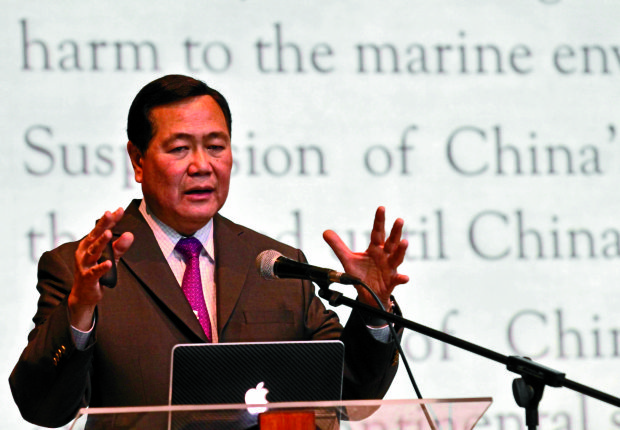PH urged to take China war threat to UN
President Rodrigo Duterte should take China to the United Nations (UN) for threatening the Philippines with war if it drills for oil in an area in the West Philippine Sea that has already been declared within its exclusive economic zone (EEZ), Supreme Court Associate Justice Antonio Carpio said on Saturday.
The world body “outlaws the use or threat of force” to settle disputes between nations, and its threat could be considered a gross violation of the UN Convention on the Law of the Sea (Unclos) as well as a treaty of amity and cooperation in Southeast Asia, Carpio said.
Mr. Duterte disclosed on Friday that Chinese President Xi Jinping warned him of war if he insisted on drilling for oil in the South China Sea.
While he did not mention any specific areas in the sea region, the President was apparently referring to Recto (Reed) Bank, which is believed lying atop vast oil and gas deposits, but have not been utilized due to the territorial dispute.
The Permanent Court of Arbitration in The Hague ruled last year that the Philippines had sovereign rights in its 370-kilometer EEZ.
Article continues after this advertisementIn effect the ruling meant that the Philippines can access offshore oil and gas fields, including on Recto Bank, 157 km off its coast.
Article continues after this advertisement“As a nation that under its Constitution has renounced war as an instrument of national policy, the Philippines’ recourse is to bring China’s threat of war to another Unclos arbitral tribunal, to secure an order directing China to comply with the ruling of the Unclos arbitral tribunal that declared Reed (Recto) Bank part of the Philippine EEZ,” Carpio said in a statement.
Recto Bank is vital to Philippine national interest as a replacement to Malampaya, which supplies 40 percent of the energy requirement of Luzon.
He added that the government could also claim damages from China for the period of delay that the Philippines is prevented from exploiting its EEZ.
Carpio said Mr. Duterte has a “constitutional duty” to use all legal means under international law to protect the country’s territory, refuting a claim by the President that he was helpless to counter Xi’s threat except to cooperate.
“Acquiescence means the Philippines will lose forever its EEZ in the West Philippine Sea to China,” Carpio stressed, adding that the President “cannot simply do nothing.” He said inaction was the “opposite” of protecting the country’s territorial boundaries.
The Supreme Court senior associate justice pointed out that the Philippines can also bring the threat of war before the UN General Assembly by sponsoring a resolution condemning China and demanding its compliance with the ruling of the arbitral tribunal.
In the face of China’s threat, Carpio said the Philippines could also strengthen its defenses and alliances, particularly with the United States, with which it has an existing mutual defense treaty.
“The Philippines cannot ally with China because China wants to grab for itself the West Philippine Sea and the Spratlys,” he said.
“As long as China threatens the Philippines with war over the West Philippine Sea, the Philippines can never lower its guard in its dealings with China,” Carpio said.
He said Xi’s war threat “reveals the aggressive design of China against the Philippines.”
“This extremely troubling development calls for all Filipinos to unite to defend the West Philippine Sea in accordance with the Constitution, international law and Unclos,” Carpio said.
RELATED VIDEO
[ventuno id=’OTM3ODExfHwyMzY4fHwxMDg2fHwxLDIsMQ==’][/ventuno]
For comprehensive coverage, in-depth analysis, visit our special page for West Philippine Sea updates. Stay informed with articles, videos, and expert opinions.
